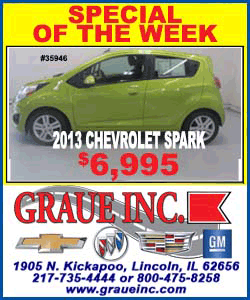Wall Street Weekahead: Retailers in spotlight as tariffs on consumer
products kick in
 Send a link to a friend
Send a link to a friend
 [August 31, 2019]
By Noel Randewich [August 31, 2019]
By Noel Randewich
SAN FRANCISCO (Reuters) - U.S. retailers
will be front and center on Wall Street next week as the United States
imposes new tariffs on $300 billion worth of Chinese imports, including
clothing, televisions and jewelry.
The upcoming tariffs on Chinese goods will hit consumers more directly
than duties already levied against $250 billion worth of imports.
Retailers are scrambling to cut costs and find ways to minimize the
damage to their bottom lines, while Wall Street analysts try to identify
those best positioned to weather the taxes.
The U.S. government is set impose tariffs on the newest list of products
starting Sept. 1, with tariffs on about half of those goods delayed
until Dec. 15 in a bid to soften their impact on holiday shoppers.
President Donald Trump last week upped the tariffs to 15% from an
originally planned 10%.
Trump's aggressive stance and often mixed signals in his trade war with
China have taken a toll across Wall Street in recent weeks, especially
on the shares of companies that rely heavily on the world's
second-largest economy.

Wall Street rallied on Thursday after China's commerce ministry said
both sides were discussing the next round of talks. Still, since Aug. 1,
when Trump announced the September tariffs, the SPDR S&P Retail ETF <XRT.P>
has slumped 6%, while the broader S&P 500 <.SPX> has fallen 2%.
The Sept. 1 tariffs include consumer electronics worth $52 billion,
including smart speakers, earbuds and televisions, according to the
Consumer Technology Association, an industry group.
Tariffs kicking in on Dec. 15 include consumer electronics worth $115
billion. That includes smartphones, laptops and videogame consoles,
directly hitting tech companies, including Apple Inc <AAPL.O>, Microsoft
Corp <MSFT.O> and HP Inc <HPQ.N>.
Investors are looking for retailers most able to hold prices steady
without hurting their margins, or increase prices without hurting demand
for their products. They are also looking for companies that rely less
on China for their wares.
"We're leaning in on quality across our Hardline Retail universe,
favoring retailers with scale, pricing power in respective categories,
less elastic products, and a greater focus on (professional) influenced
sales and initiatives," Wells Fargo Securities analyst Zachary Fadem
wrote in a report this week.
On that basis, Home Depot Inc <HD.N> and Lowe's Companies Inc <LOW.N>
are best-positioned to weather the tariffs, relying on China for 10% or
less of their cost of goods sold, Fadem wrote.
At the other extreme, Best Buy Co Inc <BBY.N> on Thursday gave a
lower-than-expected full-year outlook, blaming tariffs and uncertainty
about future consumer behavior, sending its stock down 8% and extending
its loss to 17% in August.
[to top of second column]
|

A trader works on the floor at the New York Stock Exchange (NYSE) in
New York, U.S., August 14, 2019. REUTERS/Eduardo Munoz

Executives on Best Buy's analyst call said about 60% of the consumer
electronics retailer's cost of goods sold comes from China, and that
it was working on lowering that to 40% next year.
A basket of companies impacted by the trade war, created by
Barclays, has fallen around 8% this month, underperforming the S&P
500. Barclays’ basket includes consumer-facing companies that it
estimates receive over 40% of their sales from products imported
from China, including Apple, Nike Inc <NKE.N> and Whirlpool Corp <WHR.N>.
Tariffs starting on Sept. 1 will affect $39 billion worth of
footwear and clothing, with the December tariffs affecting another
$12 billion worth of such products, according to the American
Apparel & Footwear Association.
Heavyweight retailers, including Walmart Inc <WMT.N>, Costco
Wholesale Corp <COST.O>, Target Corp <TGT.N> and Home Depot, can
adjust their global supply chains and use their clout to force
suppliers to accept smaller margins to offset the tariffs, giving
them an advantage over smaller competitors.
Showing that investors are willing to buy retailers positioned to
weather the trade war, Walmart has gained 7% since its quarterly
report on Aug. 15, when it said it had raised the prices of some of
its items due to tariffs but was not passing all the cost pressure
it faces on to consumers.
Target has surged 26% since its Aug. 21 quarterly report, when it
boosted its full-year profit outlook, even after accounting for
potential additional tariffs.

A letter this week to Trump from over 200 U.S. footwear companies,
including Adidas <ADSGn.DE> and Foot Locker Inc <FL.N>, warned that
the upcoming tariffs would exacerbate economic uncertainty and could
drive up prices in other countries that produce footwear, given
limited production capacities.
Abercrombie & Fitch Co <ANF.N> slumped 15% on Thursday after the
apparel retailer cut its full-year sales forecast in anticipation of
the new tariffs.
(Reporting by Noel Randewich in San Francisco; Editing by Alden
Bentley and Dan Grebler)
[© 2019 Thomson Reuters. All rights
reserved.]
Copyright 2019 Reuters. All rights reserved. This material may not be published,
broadcast, rewritten or redistributed.
Thompson Reuters is solely responsible for this content. |